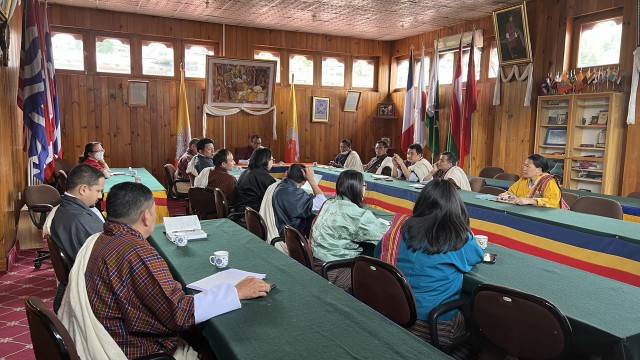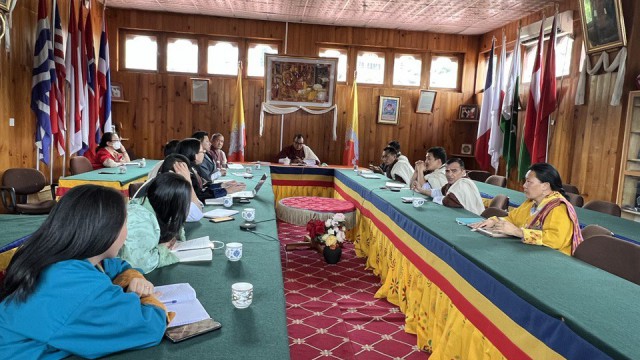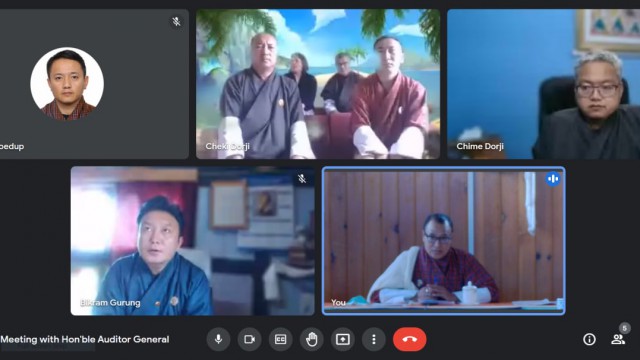Background
Cost cutting measures have been in place for the RAA even before the COVID-19 pandemic. For instance, the carpooling for auditors was strictly practised even before it was stipulated in the BCSR 2018. With the country undergoing unprecedented times, the RAA enforced further stricter cost control measures to Lead by Example and inculcate a culture of resource optimisation. An executive order on Internal Cost Cutting Measures on Controllable Expenses was issued on 23rd July 2020. Through the order, the RAA enforced cost controls in a) Mileage payment, b) Payment of Daily Allowances (DA), c) DSA payment for in-country trainings, d) Porter and pony charges, e) Furniture and computer items g) Engagement of audit team for assignments abroad and h) In-country meetings.
As the pandemic stretched to the second year, the RAA further supplemented the control measures. On 15th May 2021, the RAA decided to centralise printing facilities; issue audit reports, notifications and circulars electronically; discourage use of photocopy machines, rationalise advertisement expenses, rationalise newspaper subscription, minimise hosting official lunch and dinner; and withdraw fax machines and unused telephone lines amongst others. Meetings were conducted online or in a hybrid mode using platforms such as Google meet and Zoom.
With the country entering into the phase of economic recovery, the RAA felt that a little sacrifice and effort from its individual employees is expected to make a big difference in reducing pressure on the Government coffer. The cost cutting measures were further discussed during the Year End Planning and Coordination Meet held from 22-25th June 2022 at PDC in Tsirang with all the employees. During the meeting the employees suggested several cost cutting measures in the interest of the country. In addition to the employee’s suggestions, a meeting was held on 11th July 2022 with the Heads of Department, Head of Divisions and Head of Regional Offices to further decide on the measures. Since the budget for the FY 2022-23 has been drastically reduced by almost 20% compared to the past years, it is expected to have a severe impact on audit coverage during the year 2022-23.The meeting unanimously agreed that the travel expenses are the major areas that should be considered for control measures. Accordingly, the meeting decided to embrace interventions aimed at containing the cost related to travel.
Cost cutting interventions
With the sole objective of reinvigorating the culture of resources optimization, the meeting reached to the consensus to adopt stricter measures as indicated hereunder:
- Half DA payment for travel of more than 30 days
For travel duration of more than 30 days, full DA shall be paid only for the first 30 days and remaining duration will be paid 50% DA as per prevailing rules. The audit of Dzongkhag including Gewogs shall be considered as one audit. When the duration of audit exceeds 30 days, full DA shall be paid only for first 30 days and shall be paid only 50% DA for the remaining days;
- Payment of Porter and pony charges
Payment of porter and pony charges are discouraged. For those areas which require actual use of porter and pony, the audit team shall seek prior approval from the Top Management to avail the facilities.
- Invest time in audit planning
The Teams shall spend a minimum of 20 to 30 percent of allocated time of audit for planning the audit in office. With the proliferation of IT systems in audited agencies, audit planning has become much easier as the financial information can be generated from the e-PEMs and other systems.
- Embrace remote/hybrid auditing
The RAA introduced remote /hybrid audits on a pilot basis during the FY 2021-22 by a few divisions and regional offices. Based on the need to embrace such an approach of auditing even during the post pandemic times, RAA developed a guideline on Remote/Hybrid audit and has already identified agencies to cover under Remote audits during the FY 2022-23. Such audits are expected to achieve a high level of flexibility and not compromise the quality of audits. The same audit process can be carried out in the same way and get the same results remotely with the use of ICT and also on-site visits can be undertaken, if necessary
5) Car pooling
The Divisions in Head Office and the Regional Offices shall use pool vehicles to drop and pick up field auditors and also continue to embrace carpooling, when pool vehicle is not available.
In addition to containing costs related to travel, the RAA also decided to reduce expenses on Entertainment and In-country meetings and celebrations. Within the year 2022-2023, the RAA will do away with the culture of serving working lunches for official meetings and workshops with the exception of training programmes held in the Professional Development Centre, Tsirang.
The above measures are only minimum controls and the Departments and Division are expected to exercise further prudence, wherever practical.



